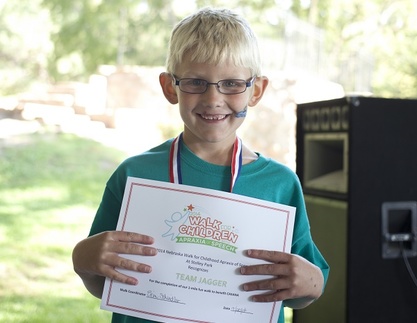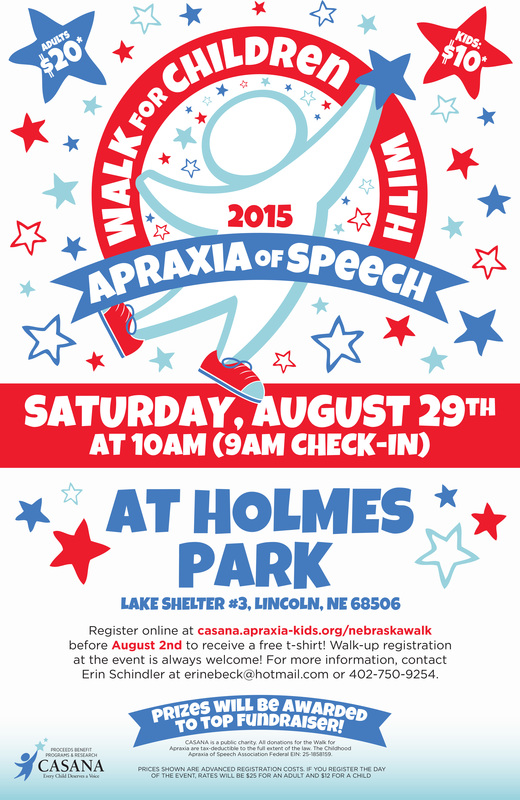 Two former Neligh residents are encouraging others to support children - like their son - who are finding their voice. Austin and Erin (Beck) Schindler are coordinating the third annual Nebraska Walk for Children with Apraxia of Speech. The Schindlers currently reside in Central City with their three children. Their son, Jagger, now 8 years old, was diagnosed with Childhood Apraxia of Speech when he was just a toddler. Jagger is the grandson of Eddie and Marlene Schindler of Neligh, Gary and Jayne Arehart of Elgin and Wayne and Denise Beck, formerly of Neligh. Childhood Apraxia of Speech (CAS) is a little known disorder which makes it difficult, or impossible, for children to accurately produce sounds, syllables, and/or words, despite having a good understanding of language. CAS is a neurological motor planning speech disorder. This is not because of muscle weakness or paralysis. The brain has difficulty planning to move the body parts (e.g., lips, jaw, tongue) needed for speech. The child knows what he or she wants to say, but his/her brain has difficulty coordinating the muscle movements necessary to say those words. "Our son, Jagger, was born at 41 weeks at 8 pounds, 6 ounces," Erin said. "He is our second child, first boy. Jagger seemed to be such a happy, content, quiet baby. He really never cried much. We noticed as a baby that he didn't make the same sounds and babbles as our oldest daughter did. We brought up our concerns to our pediatrician, our family and our friends." She said the response was the same: "He is a boy and they develop at a slower pace and he has an older sister to to help him speak." At 12 months, Jagger spoke no words and made very few sounds. "Finally at 18 months, we recognized that Jagger was very behind his peers and asked for a further evaluation," Erin said. "Early Intervention through our school system came into our home and evaluated Jagger, finding that his receptive skills were much higher than his expressive skills. He began receiving speech services in our home. After 7 months of little to no improvement, we decided, at the recommendation of our pediatrician, to have Jagger evaluated at the Barkley Memorial Center on the UNL campus. This is where Jagger received his diagnosis of Severe Childhood Apraxia of Speech and started therapy 2 times a week in Lincoln and once a week in Central City." "Jagger has made phenomenal progress through his hard work, determination and through the support of his amazing therapists, teachers, family and friends," she said. "Currently, Jagger attends speech therapy once a week and receives speech/language services at school." Erin said she and Austin "are very honored and excited to be coordinating the third annual Walk for Apraxia in Nebraska to honor our son Jagger, who has been diagnosed with apraxia." "With speech therapy and other support, he has made phenomenal progress and we are so proud of his achievements," she said. "We, as a family, want to do all that we can to help our son find his voice and to help all local children through Apraxia awareness and by educating school systems, the community, family and friends about Apraxia. The Nebraska Walk for Children with Apraxia of Speech is set to take place Saturday, August 29 at Holmes Lake in Shelter #3 in Lincoln and will be open to all adults and children. There will be clowns, a fire truck demonstration and Homer the mascot from the Lincoln Salt Dogs on hand for the event. On-site registration and check-in will begin at 9:00 a.m., with the walk starting at 10:00 a.m. The Walk for Children with Apraxia of Speech is held as a means to heighten awareness and to gain funding. Anyone interested in registering, making a donation, or learning more about the event can contact Schindler by email at: [email protected]; phone: 402-750-9254; or visit the event website: http://casana.apraxia-kids.org/nebraskawalk. You may also call Austin Schindler at 308-482-0644 for more information. "Raising awareness for Childhood Apraxia of Speech is very important to us as before Jagger was diagnosed we had never even heard of CAS," Erin said. "The support we have received from CASANA, the only national organization dedicated to Apraxia, is truly amazing! If we help one family with support, resources and early intervention it makes it all worth it!" Childhood Apraxia of Speech affects 1-2 out of every 1000 children. It more commonly affects boys more than girls. Currently, all of the causes of CAS are not known. Most often no specific cause is found. However, some children may have CAS as part of a larger neurological diagnosis or as a part of a genetic, metabolic, or mitochondrial disorder. In CAS, children do not follow typical patterns and will not make progress without treatment. There is no cure, but with early intervention and appropriate intense, frequent speech therapy by a trained speech language pathologist significant progress can be made. Speech therapy for children with CAS is focused on providing the child with a great number of opportunities to practice planning, programming and then producing accurate movements of speech. |
|
News That Matters To Antelope County - Your News. Your Way. Every Day!
© Pitzer Digital, LLC











 RSS Feed
RSS Feed


